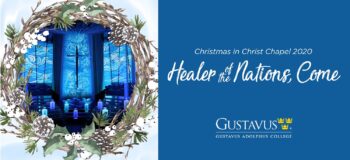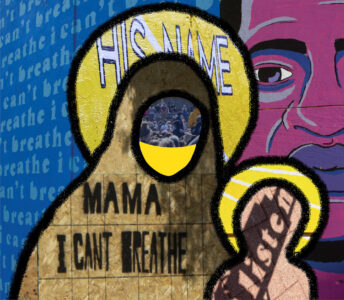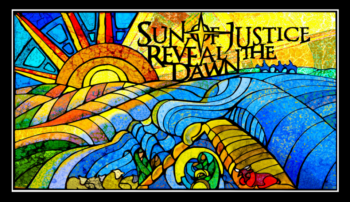By John Mai
A pandemic that began in Lent has now stretched its way to Advent. Holy Week, Easter, and 25 long weeks of Pentecost have gone by without the comfort and familiarity of gathering together for most members of Minneapolis Area Synod congregations. Now, in a season that is particularly characterized by hymns, offertories, carolings, Messiah sing-alongs, and concerts, musical traditions also need to adapt.
For many, Lutheran colleges and universities across the Midwest play a special role in marking the beginning of Advent. Gustavus Adolphus in St. Peter, Minnesota; Luther College in Decorah, Iowa; Augsburg University in Minneapolis; St. Olaf College in Northfield, Minnesota; and Concordia College in Moorhead, Minnesota all produce annual Christmas programs. The consistency of these programs provides routine for college students and their families, alumni, fellow Lutherans, and all who enjoy high caliber collegiate music.
Gustavus Adolphus College each year produces what is more of a worship service than a concert. Dr. Brandon Dean, director of the Gustavus Choir and artistic director for the college’s Christmas in Christ Chapel, has worked hard to ensure that this year’s service is not snuffed out by the coronavirus. Instead of hosting Christmas in Christ Chapel as a live event in St. Peter, all parts of the service have been recorded ahead of time and will be available to view online.
“It’s been a really taxing semester for the students,” Dr. Dean comments. For the first three weeks of the  academic year, Dean’s students in the Gustavus Choir simply learned notes via Zoom, a process that Dean described to be quite mundane. Once the college’s ensembles were allowed to rehearse together, it was a gift they did not squander.
academic year, Dean’s students in the Gustavus Choir simply learned notes via Zoom, a process that Dean described to be quite mundane. Once the college’s ensembles were allowed to rehearse together, it was a gift they did not squander.
Meg Nipe, class of ‘21 and section leader in the Gustavus Choir, has multiple years of collegiate music under her belt. She recalls, “I didn’t realize how much I missed being in an ensemble until our first in-person rehearsal.” Once ensembles did begin to rehearse in person, any ensemble with voices, woodwinds, or brass could only rehearse for 30 minutes at a time before stopping to let the rehearsal space breathe. This precaution, along with masks and increased physical distancing, is common practice among ensembles that rehearse together while the coronavirus is prevalent.
Planning meetings for these collegiate Christmas programs begins nearly a year ahead of their scheduled performance.
Planning meetings for these collegiate Christmas programs begins nearly a year ahead of their scheduled performance. That being said, the arrival of the coronavirus in the United States disrupted many plans that were already underway. Schools saw that it was necessary to acknowledge the new realities that the pandemic brought with it. This meant changing themes, reselecting pieces, and trying to predict what the world would possibly look like nearly nine months in the future.
In this way, Gustavus adapted a theme for this year’s Christmas in Christ Chapel: Healer of the Nations, Come. In the service itself, this theme captures current regional, national, and global challenges “through the lens of the nativity,” explains Dean. All types of healing are imperative in the context of COVID-19, and Christmas in Christ Chapel aligns that healing theme with the healing that comes from the nativity.
Before the academic year began, Nipe knew that making music at Gustavus would be different, and she prepared for the worst. When the fall finally came, just having the opportunity to record live music “exceeded expectations” that Nipe had for her senior year. When the pandemic created an uncertainty in the future of her singing at Gustavus, she realized how much of a privilege it is to create music.
ALTHOUGH THE PANDEMIC has limited some artistic capabilities in these programs, it has also opened the door for creativity. Luther College’s online Christmas at Luther will be a prime example of these new options.
“It’s going to look so different,” says Dr. Andrew Last, artistic director for Luther’s concert. No longer confined to an indoor performance, this year’s concert will have what Last describes as a more “informal look.” Luther students will be seen performing in less casual concert attire, and even bundled up in winter coats. Many recording sessions took place outdoors in October, capturing the changing of the seasons in Decorah. The production team even used drone footage to showcase the scenic campus.
To prepare for these recording sessions, Last knew that “we’d have to get going immediately” to have any chance at pulling together the concert. So, at the beginning of Luther’s fall quarter, ensembles immediately began preparing their Christmas music. Ryan Ferguson, class of ’21, was elected president of Luther’s Nordic Choir this past spring. He states retrospectively, “We knew in May that the fall was not going to be the same.” Fortunately, the foresight of the college’s leadership enabled them to reimagine a more creative Christmas at Luther.
In the heart of Minneapolis, Augsburg University has also shaped its Advent Vespers into an online experience. Without being limited to a single event, this year’s vespers include virtual devotions throughout the first week of Advent, culminating in a final pre-recorded vespers service at the end of the week.
Similarly to Gustavus Adolphus, Augsburg’s program contains elements of both service and performance. Cathy Knutson, producer for Advent Vespers, says that one goal of the service is “to have the basic feel of vespers,” but at the same time not “be constrained by that.”
“Just as the motifs for these many programs was appropriately shaped by the pandemic, Augsburg’s theme — Come Now, Breath of God — was particularly shaped by George Floyd.”

Artwork created by Olivia House ’20 for Augsburg University’s 41st Annual Advent Vespers — Come Now, Breath of God
Augsburg accomplished this by filming for the service in a variety of locations. The final product includes shots from campus, the surrounding city, and the magnificent Central Lutheran Church. Additionally, a virtual choir (comprised of musicians recorded individually, as opposed to recorded as an ensemble) will perform the main musical piece of the service.
The college’s two campus pastors – Justin Lynd-Ayres and Babette Chatman – created the liturgy for Advent Vespers, combining traditional vespers liturgy with elements that the two of them wrote together. Rev. Chatman’s colleagues credit her with coming up with the theme for the service: Come Now, Breath of God.
Just as the motifs for these many programs was appropriately shaped by the pandemic, Augsburg’s theme was particularly shaped by George Floyd. Following his murder, Rev. Chatman herself recalls that a lot of Augsburg students played a role in the uprising that followed. Even more notably, “the university stood with the students.”
In a planning meeting for Advent Vespers, Rev. Chatman pointed out the significance of breath in this moment. For her, to say “come now, breath of God” acknowledges how George Floyd’s breath was taken from him, and it acknowledges the need for God’s breath to come to those who are affected most by injustice. After all, “it’s this kind of uprising that Christ came in the midst of,” says Rev. Chatman.
THIS YEAR, St. Olaf’s Christmas Festival will share in marking the beginning of the Advent season. It’s a concert whose history is deeply rooted in the traditions of the college, and one that would sell out the entire Skoglund Center during a normal year.
To honor the rich history of the 108-year-old festival, St. Olaf will premiere this year’s Christmas Festival as a compilation of archival material from years past. The theme for the concert, All Earth is Hopeful, is manifested in its multicultural selections. The vision for the program is to combine the college’s Lutheran, Scandinavian heritage with Latin-American culture.
“Music is one of the last places where people with different views can put their differences aside.”
 Dr. Anton Armstrong, director of the St. Olaf Choir and artistic director for Christmas Festival, explored every option before arriving at the decision to reuse material. He, along with Dr. Kathryn Ananda-Owens, Department Chair of Music, examined their rehearsal and performance spaces and determined they could not accommodate the extra spacing that COVID-19 requires. Although unable to rehearse for a Christmas performance this academic year, musicians at St. Olaf have kept busy, preparing for their smaller choral and instrumental showcase concerts.
Dr. Anton Armstrong, director of the St. Olaf Choir and artistic director for Christmas Festival, explored every option before arriving at the decision to reuse material. He, along with Dr. Kathryn Ananda-Owens, Department Chair of Music, examined their rehearsal and performance spaces and determined they could not accommodate the extra spacing that COVID-19 requires. Although unable to rehearse for a Christmas performance this academic year, musicians at St. Olaf have kept busy, preparing for their smaller choral and instrumental showcase concerts.
Musicians at St. Olaf – faculty and students alike – will undoubtedly continue to innovate through and past the age of this pandemic. Dr. Armstrong believes that “[music] is one of the last places … where people with different views can put their differences aside.” His belief in this reality will continue to be a driving force in St. Olaf’s reputation.
CONCORDIA COLLEGE IN Moorhead, alongside its sibling schools, has fought to bring its Christmas concert into fruition. It has come across many of the same hardships, faced many of the same difficult decisions, and mourned the same loss of the anticipated academic year. The persistent reality of masks, distancing, and limited rehearsal time wears thin on students and faculty whose time and energy are already being drained by a pandemic.
 “Our students needed a capstone,” explains Dr. Michael Culloton, Director of the Concordia Choir, director of choral activities, and artistic director for Concordia’s Christmas Concert. With the irregularity and infrequency of rehearsals, creating music in adverse circumstances can be strenuous. However, with a concrete goal of producing a Christmas concert, Concordia’s musicians were given a light at the end of the tunnel.
“Our students needed a capstone,” explains Dr. Michael Culloton, Director of the Concordia Choir, director of choral activities, and artistic director for Concordia’s Christmas Concert. With the irregularity and infrequency of rehearsals, creating music in adverse circumstances can be strenuous. However, with a concrete goal of producing a Christmas concert, Concordia’s musicians were given a light at the end of the tunnel.
This year’s theme for Concordia College’s Christmas Concert is Sun of Justice, Reveal the Dawn, chosen in response to the injustices that have been especially evident this year. “There’s a lot of darkness we can easily get trapped in,” says Mallory Rabehl, class of ’21 and student manager of the Concordia Choir. Rabehl fervently believes that where there is oppression, God gives liberation. Referencing the pandemic, social unrest, and issues that disproportionately affect people of color, Dr. Culloton affirms, “If we don’t confront the issues of justice, [students] would feel that missing from their lives.” The theme not only ties the concert together, but gives Concordia’s performers — and their audience — something to latch on to.
“The persistent reality of masks, distancing, and limited rehearsal time wears thin on students and faculty whose time and energy are already being drained by a pandemic.”
Despite all the challenges the pandemic has placed in the way, all the scheduling and rescheduling, all the virtual rehearsals, all the masks, distance, and recording sessions, Lutheran schools are successfully pulling together beautiful Christmas performances. Directors are leading; students are persisting; music is prevailing. Dr. Culloton puts it quite succinctly: “Art wins.”
Performances from all five of these schools are free and available to the public. Do note that some may require registration in advance. See below for more details.
Augsburg University: Friday, December 4 @ 7:00 p.m.
Luther College: Friday, December 4 @ 7:30 p.m.
St. Olaf College: Sunday, December 6 @ 3:30 p.m.
Concordia College: Available December 18-27
Gustavus Adolphus College: Saturday, December 19 @ 7:30 p.m.
